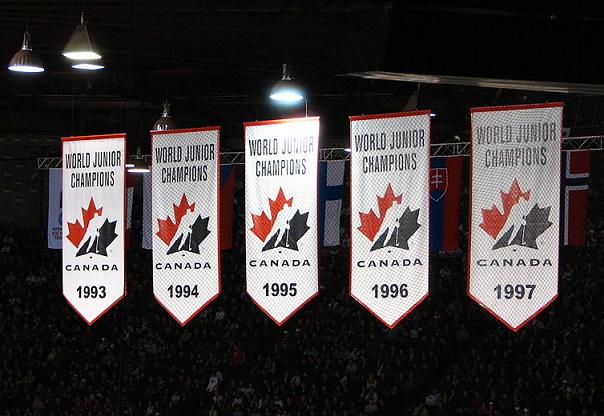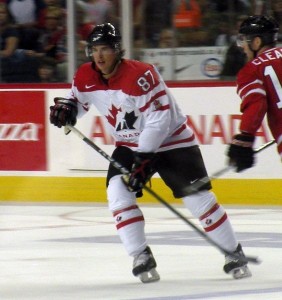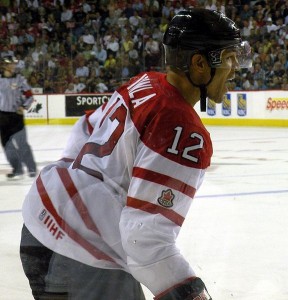
The Montreal Canadiens, The New York Yankees, The Boston Celtics, The Green Bay Packers. These are the most hallowed teams in professional sports and with good reason. From the four major North American sports leagues, only these clubs can boast the ultimate accolade: the most championships won in their respective sport.
In sports, winning is everything, and no team has done it better than the Habs, the Pack, the Celtics & the Yankees.
No team except for one that is. Team Canada.
While the Montreal Canadian’s 24 Stanley Cup titles in 100 years is undeniably impressive and cause for admiration, it pales in comparison to Team Canada`s accomplishment in hockey`s most elite competitions.
Consider the facts:
Team Canada has won 24 IIHF titles in the 73 year history of the European Championships, more than any other national team.
This is the same number of professional hockey championships won by the fabled Habs, but done so in 27 less attempts, and in a tournament where the odds are typically stacked against North American teams. Scheduled directly opposite the Stanley Cup Playoffs, and typically hosted in European countries where time zone adjustments and partisan attendance create a significant home ice advantage for the European teams, Team Canada is nevertheless the most dominant team in the history of Europe`s most prestigious annual hockey championship.
Canada: Hockey`s Global Superpower
But Team Canada`s dominance does not end there. In fact, when the Great White North is able to send its best players to compete in global hockey championships, it is then that Team Canada`s supremacy as a sports team becomes truly noteworthy.

To wit: The Canada Cup (later the World Cup of Hockey) was developed to address a clear deficiency in the global hockey landscape, the lack of a tournament pitting the best professionals in the world against each other to establish the dominant national team in hockey. Despite its obvious prestige as the defacto European Championship of Hockey, the annual IIHF tournament consistently failed to attract the top talent in the game with most of the top players in the world otherwise occupied competing for the Stanley Cup. Until 1998, the ice hockey competition in the Olympic Games was similarly flawed. Billed as an amateur only competition, the Olympics forbade NHL professionals from playing, severely tilting the odds in favor of European clubs like the Soviet Union who consistently sent squads to the Games stacked with pseudo-amateurs, all of whom played for the U.S.S.R.`s elite hockey clubs but were paid instead as soldiers in the Red Army to corroborate their so-called ‘amateur status.’
The playing field was finally leveled in 1976 with the debut of the Canada Cup, a highly competitive and entertaining tournament originated to establish which country truly held the bragging rights to global hockey supremacy. Led by the fading but still fabulous Bobby Orr, Team Canada won the inaugural competition in a thrilling finale over Team Czechoslovakia and proceeded to win 3 of the next 4 Canada Cups, including Team Canada`s memorable win over Team Russia in the 1987 final, a best-of-three finale that many hockey fans consider to be the best international hockey series ever played. After Canada trounced Team Sweden in the final of the 1991 Canada Cup, the tournament was re-branded as ‘The World Cup of Hockey.’ The Canadian side continued its strong showing, rebounding from an upset loss to Team USA in the 1996 World Cup with arguably the most dominant performance in the history of team sports in the 2004 World Cup of Hockey. Led by Joe Sakic, Vinny Lecavalier & Martin Brodeur, Team Canada`s powerhouse 2004 squad scored an impressive 22 goals in 6 games while giving up only 8 goals against in their undefeated romp over hockey`s elite.
Olympic Gold – The Holy Grail of International Hockey
In between the World Cups in `96 and `04, Team Canada’s best professionals finally made their Olympic debut at the 1998 Games in Nagano. In one of the most memorable defeats in Canadian hockey history, the heavily favored Canucks were stonewalled by Team Czechoslovakia`s goaltender Dominik Hasek in the climactic shootout, with the 2-1 victory launching the Czechs towards an eventual gold medal win over the Russians. Stymied by a then unfamiliar shootout format and roundly criticized for suspect coaching decisions in the tournament, among them the decision to not play the legendary Wayne Gretzky in the deciding shootout, the disappointing showing in Nagano was a much needed wakeup call for a complacent Hockey Canada.

Led in the next Olympics by the aforementioned Grezky in his new role as Executive Director, Team Canada responded with a gritty gold medal performance at the 2002 Salt Lake Olympics over a game Team USA. Combined with their dominant performance two years later in the World Cup, Team Canada had clearly staked their claim as the best hockey club in the world.
How then to explain their disastrous showing in the Torino Olympics 4 years later?
Stumbling to a decidely mediocre 3-2 record in the preliminary round including an absolutely astonishing defeat to the Swiss, Team Canada subsequently lost 2-nil to their arch-rivals, Team Russia, in the quarter-finals of the 2006 Torino Olympics. While Team Sweden would go on to win the gold in a surprising all Scandinavian final over Finland, the truth was finally dawning on Canadian hockey fans. Here at last was a hockey tournament to test the mettle of a national team sorely in need of stiffer competition.
As it stands now, heading into the highly anticipated Vancouver Olympics in 2010, Team Canada`s record in competitions inviting the best professional players in the world (I.E. the Canada Cup, World Cup, Olympics from 1998 onwards) is an unprecedented 6 titles in 10 tournaments for an unmatched Championship Winning Percentage (CWP) of 60% Given their impressive record of achievement in such tournaments, Team Canada will be the odds-on favourites in Vancouver and deservedly so. To return to the debate at hand however, and for matters of posterity, here`s a look at how Team Canada`s championship record stacks up against the winningest team dynasties in each of the 4 major North American sports.
Championship Teams: By the Numbers
| Team | League | Championship Titles | Years / Attempts | Championship Winning Percentage (CWP) |
| Green Bay Packers | NFL | 12 | 90 | 13.33% |
| Pittsburgh Steelers | NFL ( Super Bowl era only) |
6 | 43 | 13.63% |
| Montreal Canadiens | NHL | 24 | 100 | 24% |
| Boston Celtics | NBA | 17 | 63 | 26% |
| New York Yankees | MLB | 27 | 96 | 28% |
| Team Canada | IIHF Championship | 24 | 73 | 32% |
| Team Canada | Canada Cup / World Cup / Olympics (98 onwards) | 6 | 10 | 60% |
| Team Canada | Combined | 30 | 83 | 36% |
Team Canada`s dominance in international hockey is even more impressive when you consider the record of the country`s World Junior Squad at the IIHF World U20 Championship (known domestically as the World Junior Hockey Championships). Throughout the 33 years of this tournament, Team Canada`s team of future NHLers has won an amazing 15 gold medal titles (25 medals in total) for a CWP of 45% More impressively, Team Canada`s Teen Titans have twice won the Gold Medal 5 years in a row and will be shooting for an unprecedented 6th consecutive title in this year`s tournament which commences, as per tradition, this coming Boxing Day. Talk about a sports dynasty!
Naturally, there will always be debate as to which team is the most dominant in sports. If you restrict the scope to the 4 major North American sports, basketball fans will be quick to point to the dominance of Team USA in international basketball events. If you widen the scope to other sports, the zealous followers of New Zealand`s All Blacks and Brazil`s beloved soccer side inevitably factor into consideration. What is without debate is the unmatched record of Team Canada’s national hockey team and the ample opportunity that hockey fans will have to see this team in action over the coming months. With this year`s World Junior Championships followed by the Olympics in Vancouver which is then followed by the IIHF Championships in May, this is definitely shaping up as a year to remember for fans of international hockey, whatever your allegiance.
Love this! The topic is inherently debatable because it depends on how you define and measure “winning” (titles only, certain eras only, percentage based on years played, overall games, what to do about years with no championship or strike seasons). Great stuff.
I did my top 5 (http://kooztop5.blogspot.com/2012/07/top-5-all-time-winningest-sports.html) and had a hard time deciding. I didn’t include Team Canada or the All Blacks (never heard of them!)…
Incorrect article. I’m pretty sure the most winningest team in sports is the New Zealand national Rugby team, the All Blacks. In 100 years of international competition they have 364 wins from 484 games, a 77% win/loss record.
Why was the CFL champions omitted from this graph? It would also be an interesting comparison with the long history that Canadian football has on the continent in sports.
hockey Canada = futbol Brazil, with Gretzky as the Pele …